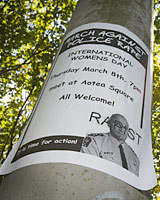|
Allegations of abuse
by NZ Police |
|
|
peterellis
Home / police allegations / Rickards,
Shipton, Schollum vs Jane Doe Page 6 - Further Reaction to
Not Guilty Verdict |
|
|
A street sign in Women will march on the Auckland
police station on Thursday to demand changes to the way sex offending cases
are dealt with following last week's acquittal of suspended Auckland police
chief Clint Rickards. Spokeswoman Jasmine Gray said the
group did not accept the verdict of a jury last Thursday that found Mr
Rickards and two former police officers not guilty of kidnapping and
indecently assaulting a 16-year-old girl in 1983-84. "I don't think it's
necessarily the facts that are being disputed. It's interpretations,"
she said. Ms Gray said Victim support groups backing the
march are calling for a shift to European-style "inquisitorial"
justice or restorative justice for sex abuse cases. Mr Rickards' lawyer, John Haigh,
QC, declined to comment yesterday, but Council for Civil Liberties president
Barry Wilson said that unlike his two co-accused, Mr Rickards had no previous
convictions and the public should recognise that a jury heard all the
evidence and acquitted him. "The jury is there to
represent the community. They are well placed to do so," Mr Wilson said.
"If you want to override their verdict by a kind of collective moral
panic, then it's the community that suffers." But as a lawyer he agreed that it
was time to look at alternative justice systems for sex offences. "As someone who has done a
very large number of sex offence jury trials, I'm sure we need to look at
alternatives to the adversarial system." National Collective of Women's
Refuges manager Heather Henare said yesterday that "mainstream She said women's refuges were
inundated with calls supporting Louise Nicholas, an earlier complainant
against Shipton, Schollum and Mr Rickards, after the three men were acquitted
of raping her in the 1980s. Many callers were older women who said they had
also been abused in the past. Refuges collected money for Mrs
Nicholas "so we could send her on a holiday". Auckland Rape Crisis educator
Kylie Tippett said women had sent in money and messages of support for the
victim in the latest case in the past few days. This time the women's groups do
not know the complainant's name and have channelled the messages to her
through the police. Detective Sergeant Max Taylor,
victim liaison officer for Operation Austin, which investigated all three
complaints, said the complainant was "most grateful" for all the
messages. Rape Crisis director Kim McGregor
said the country's 12 rape crisis groups, other victim support groups and
Doctors for Sexual Abuse Care were working with Ministry of Justice officials
to investigate better methods for handling sex offending cases. Dr McGregor said cases alleging
historical offending turned on the credibility of the complainant because
there was usually no other witness and the accused did not have to give
evidence. She said the European
inquisitorial system allowed victims to give most of their evidence in their
own words in written statements, and let judges question both the victim and
the accused to establish the truth. Another option was restorative
justice for offenders who admitted at least partial guilt and could be helped
towards making reparation to the victim and seeking treatment for their offending.
The protests * The "march against police
rape" begins with a rally in * There will be a rally in |

